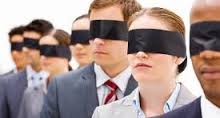 “Hysterical blindness” is a clinical term describing someone with no physiological reason for their loss of vision. It may be antique and politically incorrect terminology, but it aptly describes our modern world—as well as some of the people in this Sunday’s Old and New Testament mass readings. These people exemplify modern humanity’s chronic spiritual malady: blindness to what the light of truth makes visible in us. We prefer to hide our inconvenient truths in darkness. That happens to be an apolitically correct characterization of sin.
“Hysterical blindness” is a clinical term describing someone with no physiological reason for their loss of vision. It may be antique and politically incorrect terminology, but it aptly describes our modern world—as well as some of the people in this Sunday’s Old and New Testament mass readings. These people exemplify modern humanity’s chronic spiritual malady: blindness to what the light of truth makes visible in us. We prefer to hide our inconvenient truths in darkness. That happens to be an apolitically correct characterization of sin.
Our first reading from the Book of Samuel (1 Sm 16:1b, 6-7, 10-13a) explains the reason for our vision problem:
“Not as man sees does God see, because man sees the appearance but the LORD looks into the heart.”
That explains why Samuel had such a hard time fulfilling God’s instructions to find the next leader of Israel from among Jesse’s many sons. In their efforts to present worthy candidates for Samuel’s consideration, none of them thought that the lowliest of them could be the mightiest. Yet it was little David, the one hidden in his brothers’ shadows, who reflected rather than rejected the light of truth.
He was ruddy, a youth handsome to behold and making a splendid appearance. … Then Samuel, with the horn of oil in hand, anointed David in the presence of his brothers; and from that day on, the spirit of the LORD rushed upon David.
Neither David’s family, nor Saul whom he was to replace as king, could envision this boy as a giant killer.
Neither could the leaders of Jesus’ time envision this carpenter as the savior of the world. So when Jesus restored sight to a blind man, as detailed in Sunday’s gospel reading from John (Jn 9:1-41), those leaders remained blind to Christ’s true identity while the formerly blind man he saved could not only see the truth, but could reflect it.
“It is unheard of that anyone ever opened the eyes of a person born blind,” the man testified to the Pharisees. “If this man were not from God, he would not be able to do anything.”
They answered and said to him, “You were born totally in sin, and are you trying to teach us?” Then they threw him out.
Of course Jesus saw that the hysterically blind Pharisees couldn’t see the truth: that everything to do with humanity’s world is vane, and that blindness to such vanity opens the door to the light of truth. The blind man’s encounter with Jesus not only cured him, but made him a light source. He even tried pulling the Pharisees out of their self-imposed darkness, but as Jesus observed, their confusing that darkness with light makes their kind of blindness almost incurable.
But Paul of Tarsus, who was once just as hysterically blind as the Pharisees and, like little David, the least likely messenger of the truth, by God’s grace became its champion. Through his letter to the Ephesians (Eph 5:8-14), Paul instructed future generations not only to reflect God’s light, but to become it.
You were once darkness, but now you are light in the Lord. Live as children of light, for light produces every kind of goodness and righteousness and truth.
By the way, the modern and politically correct term for hysterical blindness is conversion disorder. If enough of us were to follow Paul’s advice we might inspire a more orderly conversion to enlightenment.
–Tom Andel